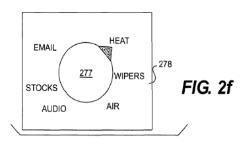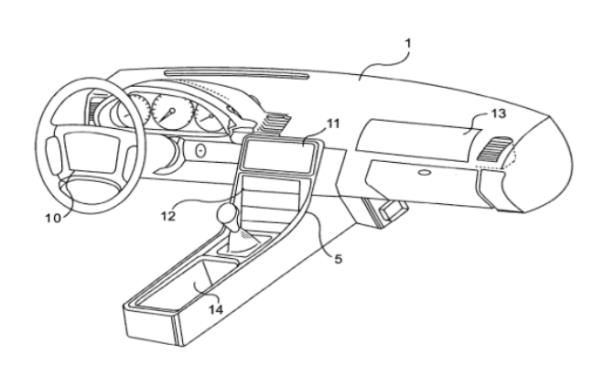
A new patent granted to Apple last week indicates the company has more plans to compete in the crowded automotive infotainment market. This fits with Apple’s mission to take existing technology and improve it through better design.
Automakers have tried copying the cutting-edge interfaces from smartphones and tablets into their cars, and many have failed. The most current touch-screen infotainment interfaces, such as MyFord Touch and Cadillac Cue – which, coincidentally, copy Apple products such as the iPhone and iPad – could use some refinement.
Last Tuesday, Apple received Patent No. 8,482,535, for which it applied in 2009. The patent covers technology ranging from a head-up display embedded in the armrest to a camera to detect the direction in which the driver is looking, which is already available from Lexus and was recently shown as a concept from Continental.
One of the most intriguing aspects of the Apple patent describes an innovative in-dash display that combines a slick, configurable touch screen with the ease of operating traditional physical knobs and buttons on the fly.
The Apple patent depicts a capacitive touch screen with tactile feedback, similar to the one used in the Cadillac Cue system, that “pushes back” against a press of the finger to confirm an operation. But the new dashboard display would also incorporate “a tactile selection or adjustment means, such as a knob, slider, or switch … generally operated in conjunction with the touch screen.”
This isn’t the combination of physical buttons and knobs found in the MyFord Touch system in the F-150 pickup, which Ford recently announced will spread to other vehicles in response to consumer criticism of the original system. Wired reported that the Apple patent includes “raised portions of the screen that would act as virtual knobs, glowing when they’re ready to be used and fading out once the action is complete.” ExtremeTech.com said, “The screen described in the patent might have ridges and indents to guide the driver’s fingers while still keeping eyes mostly on the road.”
This would allow for the best of both worlds: a programmable touch screen that also includes the physical sensation of knobs and buttons that can be operated without looking. And the tactile controls could change depending on the function, such as audio in one mode and climate controls in another. Drawings accompanying the patent show settings for features such as “email” and “stocks” as well as “wipers” and “heat.”
“This invention seeks to dramatically increase the utility of car informational displays and controls, while at the same time enhancing safety by improving sensory data presentation and ease of interaction with vehicle controls and data sources,” the patent reads.

After years of sitting on the sidelines, Apple began a major push against traditional automotive suppliers when it announced that nine automakers would incorporate its Siri voice assistant. But a year later, the feature is still unavailable on most new cars.
In June, Apple unveiled a feature called iOS for the Car, which will be part of its next major mobile software rollout. The portable device integration strategy allows playing music, making phone calls, using Apple Maps and accessing text messages from a car’s in-dash screen using Siri Eyes Free.
The new patent states, “The invention can be built at lower cost than a conventional dashboard, especially as vehicles become ever more loaded up with navigational systems and other electronics.”
While lowering costs holds a strong appeal to automakers, Apple has never been known for cheap products. Still, if it goes right, the new Apple technologies could be cause for celebration among drivers frustrated with the current state of cutting-edge infotainment – and concern among competitors.
Doug Newcomb has been covering car technology for more than 20 years for outlets ranging from Rolling Stone to Edmunds.com. In 2008, he published his first book, "Car Audio for Dummies" (Wiley). He lives and drives in Hood River, Ore., with his wife and two kids, who share his passion for cars and car technology, especially driving and listening to music.
Source: MSN
No comments:
Post a Comment